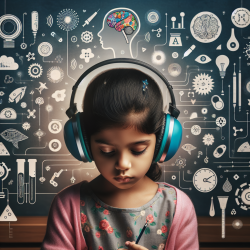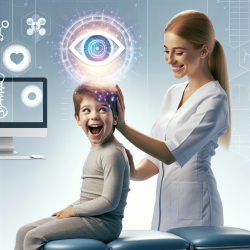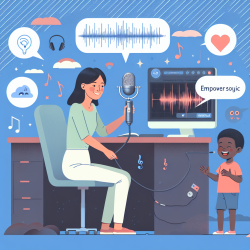Building Bridges of Unity: Harnessing National Identity for Better Health Outcomes

Introduction
In the realm of speech-language pathology, particularly when providing services to children, understanding the broader social and psychological contexts in which we operate is crucial. The research article "National identity predicts public health support during a global pandemic" provides insights that can be pivotal for practitioners aiming to improve outcomes for children through online therapy services. This blog explores how the findings of this study can be applied to enhance the effectiveness of therapy sessions and encourage further research in this area.
The Power of National Identity
The study conducted by Van Bavel et al. (2022) highlights the significant role that national identity plays in motivating public health behaviors during a pandemic. It was found that individuals who strongly identify with their nation are more likely to engage in health-supportive behaviors, such as maintaining spatial distance and supporting public health policies. This suggests that national identity can be a powerful tool in fostering collective action and compliance with health guidelines.
Application in Speech-Language Pathology
As practitioners, we can leverage the concept of national identity to foster a sense of community and shared responsibility among children and their families. Here are some strategies to consider:
- Incorporate Cultural Contexts: When designing therapy sessions, incorporate elements that resonate with the child's cultural and national identity. This can help children feel more connected and engaged, thereby enhancing the effectiveness of the therapy.
- Promote Group Activities: Encourage group activities that emphasize collective goals and cooperation. This can be particularly effective in online therapy settings where children can interact with peers from diverse backgrounds, fostering a sense of unity and shared purpose.
- Educate Families: Provide resources and education to families about the importance of national identity and its role in promoting health behaviors. This can empower families to support their children in adopting positive health practices.
Encouraging Further Research
While the study provides valuable insights, there is a need for further research to explore how national identity can be specifically leveraged in speech-language pathology. Practitioners are encouraged to conduct studies that investigate the impact of culturally relevant therapy approaches on children's outcomes. Additionally, exploring the role of national identity in different cultural contexts can provide a more comprehensive understanding of its influence on health behaviors.
Conclusion
Incorporating national identity into therapy practices can be a powerful strategy for improving health outcomes. By fostering a sense of unity and shared responsibility, practitioners can enhance the effectiveness of therapy sessions and support children in developing positive health behaviors. As we continue to navigate the challenges of providing online therapy services, let us embrace the insights from this research and strive for data-driven, culturally informed practices.
To read the original research paper, please follow this link: National identity predicts public health support during a global pandemic.
Citation: Van Bavel, J. J., Cichocka, A., Capraro, V., Sjåstad, H., Nezlek, J. B., Pavlović, T., Alfano, M., Gelfand, M. J., Azevedo, F., Birtel, M. D., Cislak, A., Lockwood, P. L., Ross, R. M., Abts, K., Agadullina, E., Aruta, J. J. B., Besharati, S. N., Bor, A., Choma, B. L., Crabtree, C. D., Cunningham, W. A., De, K., Ejaz, W., Elbaek, C. T., Findor, A., Flichtentrei, D., Franc, R., Gjoneska, B., Gruber, J., Gualda, E., Horiuchi, Y., Huynh, T. L. D., Ibanez, A., Imran, M. A., Israelashvili, J., Jasko, K., Kantorowicz, J., Kantorowicz-Reznichenko, E., Krouwel, A., Laakasuo, M., Lamm, C., Leygue, C., Lin, M. J., Mansoor, M. S., Marie, A., Mayiwar, L., Mazepus, H., McHugh, C., Minda, J. P., Mitkidis, P., Olsson, A., Otterbring, T., Packer, D. J., Perry, A., Petersen, M. B., Puthillam, A., Riaño-Moreno, J. C., Rothmund, T., Santamaría-García, H., Schmid, P. C., Stoyanov, D., Tewari, S., Todosijević, B., Tsakiris, M., Tung, H. H., Umbreș, R. G., Vanags, E., Vlasceanu, M., Vonasch, A., Yucel, M., Zhang, Y., Abad, M., Adler, E., Akrawi, N., Mdarhri, H. A., Amara, H., Amodio, D. M., Antazo, B. G., Apps, M., Ay, F. C., Ba, M. H., Barbosa, S., Bastian, B., Berg, A., Bernal-Zárate, M. P., Bernstein, M., Białek, M., Bilancini, E., Bogatyreva, N., Boncinelli, L., Booth, J. E., Borau, S., Buchel, O., Cameron, C. D., Carvalho, C. F., Celadin, T., Cerami, C., Chalise, H. N., Cheng, X., Cian, L., Cockcroft, K., Conway, J., Córdoba-Delgado, M. A., Crespi, C., Crouzevialle, M., Cutler, J., Cypryańska, M., Dabrowska, J., Daniels, M. A., Davis, V. H., Dayley, P. N., Delouvee, S., Denkovski, O., Dezecache, G., Dhaliwal, N. A., Diato, A. B., Di Paolo, R., Drosinou, M., Dulleck, U., Ekmanis, J., Ertan, A. S., Etienne, T. W., Farhana, H. H., Farkhari, F., Farmer, H., Fenwick, A., Fidanovski, K., Flew, T., Fraser, S., Frempong, R. B., Fugelsang, J. A., Gale, J., Garcia-Navarro, E. B., Garladinne, P., Ghajjou, O., Gkinopoulos, T., Gray, K., Griffin, S. M., Gronfeldt, B., Gümren, M., Gurung, R. L., Halperin, E., Harris, E., Herzon, V., Hruška, M., Huang, G., Hudecek, M. F. C., Isler, O., Jangard, S., Jørgensen, F. J., Kachanoff, F., Kahn, J., Dangol, A. K., Keudel, O., Koppel, L., Koverola, M., Kubin, E., Kunnari, A., Kutiyski, Y., Laguna, O., Leota, J., Lermer, E., Levy, J., Levy, N., Li, C., Long, E. U., Longoni, C., Maglić, M., McCashin, D., Metcalf, A. L., Mikloušić, I., El Mimouni, S., Miura, A., Molina-Paredes, J., Monroy-Fonseca, C., Morales-Marente, E., Moreau, D., Muda, R., Myer, A., Nash, K., Nesh-Nash, T., Nitschke, J. P., Nurse, M. S., Ohtsubo, Y., Oldemburgo de Mello, V., O’Madagain, C., Onderco, M., Palacios-Galvez, M. S., Palomäki, J., Pan, Y., Papp, Z., Pärnamets, P., Paruzel-Czachura, M., Pavlović, Z., Payán-Gómez, C., Perander, S., Pitman, M. M., Prasad, R., Pyrkosz-Pacyna, J., Rathje, S., Raza, A., Rêgo, G. G., Rhee, K., Robertson, C. E., Rodríguez-Pascual, I., Saikkonen, T., Salvador-Ginez, O., Sampaio, W. M., Santi, G. C., Santiago-Tovar, N., Savage, D., Schönegger, P., Schultner, D. T., Schutte, E. M., Scott, A., Sharma, M., Sharma, P., Skali, A., Stadelmann, D., Stafford, C. A., Stanojević, D., Stefaniak, A., Sternisko, A., Stoica, A., Stoyanova, K. K., Strickland, B., Sundvall, J., Thomas, J. P., Tinghög, G., Torgler, B., Traast, I. J., Tucciarelli, R., Tyrala, M., Ungson, N. D., Uysal, M. S., Van Lange, P. A. M., van Prooijen, J.-W., van Rooy, D., Västfjäll, D., Verkoeijen, P., Vieira, J. B., von Sikorski, C., Walker, A. C., Watermeyer, J., Wetter, E., Whillans, A., Willardt, R., Wohl, M. J. A., Wójcik, A. D., Wu, K., Yamada, Y., Yilmaz, O., Yogeeswaran, K., Ziemer, C.-T., & Zwaan, R. A. (2022). National identity predicts public health support during a global pandemic. Nature Communications, 13, Article 517. https://doi.org/10.1038/s41467-021-27668-9










